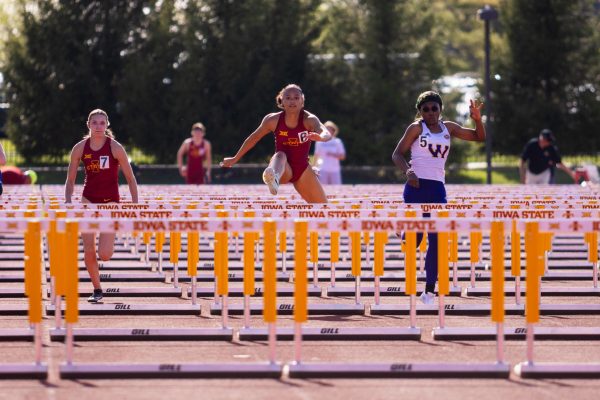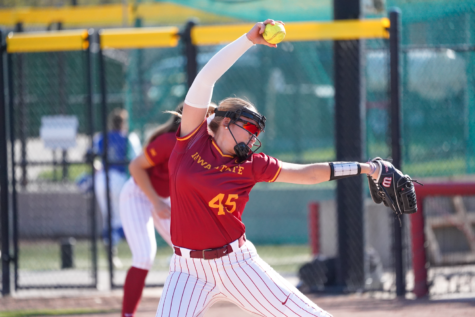Bluegrass music only one part of the World Cup party atmosphere
June 13, 2002
The fiery Korean passion for soccer burned white-hot in Daegu, South Korea Monday. The roar of 60,000 adoring Korea fans charged the long-anticipated South Korea-USA match at a fevered pitch for all 90 minutes of play.
It was a make-or-break match in the World Cup. For either team to advance, at least a draw was necessary to remain eligible for the second round. The Americans were coming off their shocking, and hard-earned 3-1 win over European powerhouse Portugal, and South Korea from their highly emotional win over Poland. Both teams boast strong offensive skill, and neither were keen on leaving Daegu with a loss.
It is true that the World Cup had been an amazing experience for the past week. We had watched Senegal draw with Denmark and South Africa edge the Slovenians. But U.S. versus South Korea was an entirely new kind of game. Festivities began several hours before the match as spectators poured in from all of Korea. The vast majority of fans wore the bright red of their national team uniforms and carried gold, black and red scarves as well as the white flag of their nation.
The handfuls of Americans stood out immediately with stars and stripes draped over their backs and smeared in bright paint across the faces. We met up with some Americans before the match for the obligatory stadium photo and exchanged news of the team.
Entire Korean families waited in long queues for an hour or more in order to get their faces painted and buy the latest world cup memorabilia. We moved to the huge pavilion on the east side of the stadium where, as we got closer, down-home bluegrass music became louder.
Was I in Kentucky or Korea?
As we turned the corner, there they were: on a stage before a vast crowd of Koreans and under an enormous white World Cup sign. Four college-age guys with a fiddle, banjo, bass and guitar, dressed in blue polo shirts and khakis were singing their hearts out about Tennessee and the mountain life. What’s more, a dance troupe of young American women in short American flag-print skirts and tap shoes were line-dancing down in front, to the amazement of the crowd. As it turns out, they were a group of college students from Tennessee and Georgia.
The twang of those classic Dixie accents and the wailing fiddle somehow fit right into a frenetic atmosphere where clearly, anything goes.
In the same pavilion traditional Korean weavers sat cross-legged on the floor, showing off their trade. In another tent, traditional pottery was for sale and mimes dressed up in futuristic and even feathered costumes in another area contributed to the environment of organized madness. Latin American TV crews, Germans, Slovenians, a smattering of Africans, other Europeans and others milled about.
This was intercultural exchange and celebration at its best.
We headed for our gate into the stadium under a warm slight drizzle, passing through security and to our seats. The house was rocking and our end of the stadium was largely responsible.
A long line of men dressed in the traditional Korean attire filled the front row below us. Photographers swarmed around them, taking advantage of the opportunity to photograph before the game began. Next to them were the huge Korean guys wearing their country’s flag bandanas, pounding massive traditional drums to keep time for the chants and songs. The rest of our section was filled largely with young Korean men and women, dressed all in red and screaming their lungs out.
With the exception of a few islands of U.S. fans, the entire stadium was an incredible mass of waving, jumping, red-shirted South Koreans. The Canadians, Brits and Australians were back in our section as well. The chants commenced about an hour before the game as fans began to pour into the stadium. The fans didn’t bother to sit down. This was standing room only, and it stayed that way for the next two hours of the match.
The game started at an incredible pace. The South Koreans, who were feeding off the roar of their home crowd, predictably dominated the first twenty minutes. One mildly inebriated American wearing little more than the stars and stripes like a cape would occasionally start screaming “USA-USA-USA” at a brief lull between Korean chants. He was then joined by the dozen or so U.S. supporters in our section. At the sound of the “USA” chant, the entire section of South Korean fans in front of us turned around in dismay and promptly started chanting “Republic of Korea” in Korean and with the drums, would get the rest of the 60,000 Koreans in the stadium going, and let’s just say the “USA” chant was drowned within 20 seconds by a raging torrent of the “Korea” song.
But it was Clint Mathis in the 24th minute who gave the nation of Korea a sudden, Earth-shaking shock when he slammed home a goal at the end right in front of our section. Months of coverage in the Korea media, two hours of deafening roar in the stadium, millions around Korea engrossed through their televisions, and everything froze in a communal moment of utter astonishment.
Within a few minutes, the chanting slowly returned and so did the spirit of the match. After 15 minutes more of neck-and-neck play, a foul was called on a U.S. defender and it was Korea’s penalty kick chance to even the score. I do not envy the young Korean by the name of Seol Ki-Hyeon. His was a kind of pressure I wouldn’t wish upon anyone. He took the shot low and hard with textbook technique, but it was Brad Friedel, the U.S. goalkeeper who, fully outstretched, just knocked it away with one hand.
Again, disbelief swept over the amassed thousands in the stadium. After half, the Korean fans were back with a thundering passion. Again and again, their offense pushed forward with several heart-stoppingly close shots. Over and over, through the heroic efforts of Friedel the U.S. keeper, the now clearly dominating Koreans were beaten back only to return to the wail of the crowd.
With only 12 minutes to go, a national hero was born. Korean forward Ahn Jung-Hwan sent the thousands into a delirious frenzy when he nailed a floating cross past Friedel to bring the match to one-all.
It was as if a hurricane blasted into the Daegu stadium. Bright white streamers and confetti filled the air. The sound made the last two hours seem quiet. For the next 12 minutes the entire nation was on a razor’s edge as they clung to every move of the Korean players.
With literally seconds to go, Choi Yong-soo missed his chance at an instant God-like status in Korean society when his shot came within inches of finding the back of the net. The referee blew the final whistle moments later and it all was over.
The party was only beginning, though, as people all over Korea – World Cup visitors and all – celebrated a game exciting beyond expectation. The stadium was afloat with the thrill, and we the fans left with ears ringing and gratefulness to the players for putting on the best show so far in world’s favorite tournament.
Omar Tesdell is a junior in journalism and mass communication from Slater.
















